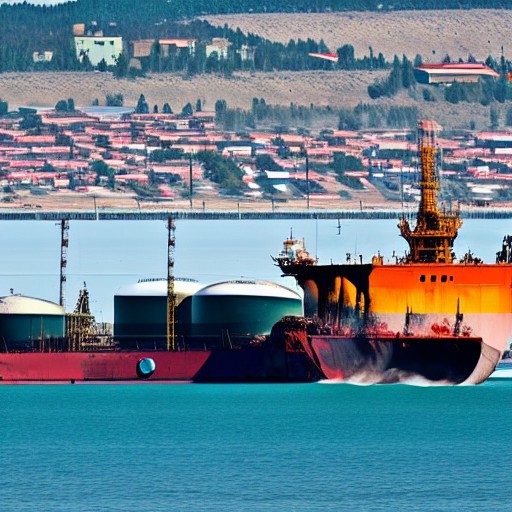- 27 April 2023
- 61
The Aftermath of Iran’s Seizure of a US-Bound Oil Tanker: Implications for International Trade

In recent weeks, tensions between the United States and Iran have escalated dramatically. One of the most notable incidents was Iran’s seizure of a US-bound oil tanker in the Strait of Hormuz. This event has sent shockwaves through international trade markets and raised concerns about potential consequences for global commerce. In this blog post, we’ll explore the impact of this tanker seizure on international trade and what steps can be taken to mitigate its negative effects. So buckle up and let’s dive into this hot topic!
The Tanker Incident
On July 18, Iranian forces seized a British-flagged oil tanker in the Strait of Hormuz. This was followed by Iran’s seizure of a US-bound tanker on August 4th. The incidents were clear indications of rising tensions between Iran and Western nations.
The US has accused Iran of attempting to disrupt international trade and freedom of navigation through their actions. While Iran claims that they are responding to sanctions imposed by the US, many countries have expressed concern over the impact these seizures could have on global commerce.
The tankers affected in this incident were carrying valuable crude oil supplies. Any disruption or delay in shipment can significantly affect supply chains and ultimately increase prices for consumers worldwide.
These events highlight how fragile international relations can be when it comes to trade routes like those found in the Persian Gulf region. It is crucial for all parties involved to find diplomatic solutions before further escalation occurs, which could lead to even more significant consequences for global commerce.
The Impact of the Seizure on International Trade
The recent seizure of a US-bound oil tanker by Iran has sent shockwaves throughout the international trade community. The implications of this incident are far-reaching and have the potential to disrupt global supply chains, increase shipping costs, and damage diplomatic relations between nations.
One immediate impact of the seizure is that it has caused a spike in oil prices due to concerns about supply disruptions. This could lead to higher transportation costs for businesses that rely on imported goods or raw materials. Additionally, companies may need to find alternative suppliers or routes to avoid potential delays at sea.
The incident also highlights the vulnerability of global shipping lanes and raises questions about security measures in place to protect valuable cargo. As tensions continue to escalate between Iran and western nations, there is growing concern that similar incidents could occur in the future.
Furthermore, this incident underscores how political tensions can easily spill over into economic affairs. The possibility of further sanctions or retaliatory actions against Iran could further complicate trade relations between countries involved.
While there are still many unknowns regarding the long-term impacts of this event on international trade, one thing is clear: any disruption in global supply chains has ripple effects across industries and economies worldwide.
What the US Can Do to Mitigate the Negative Impacts of the Seizure
The seizure of a US-bound oil tanker by Iran has had significant implications for international trade. The act was a clear violation of international law, and it is crucial that the United States takes appropriate measures to mitigate its negative impacts.
One approach that the US can take is to use diplomatic channels to resolve the issue with Iran. This could involve engaging in dialogue with Iranian officials to find a peaceful resolution to the situation. It may also mean working with other countries who have strong relationships with Iran, such as China or Russia, in order to exert pressure on Tehran.
Another option for mitigating the negative impacts of this incident would be for the US government to explore alternative transportation routes for oil shipments. For example, they could consider using pipelines or railroads instead of relying solely on tankers passing through sensitive regions like the Strait of Hormuz.
The US could also work towards diversifying their energy sources by investing more heavily in renewable energy technology. This would not only reduce reliance on foreign oil imports but also help combat climate change.
It’s important that Americans remain vigilant and informed about developments related to this incident so they can make informed decisions about their own investments and business activities in affected areas.
There are several steps that the United States can take to mitigate any negative consequences resulting from Iran’s seizure of a US-bound oil tanker. Through diplomacy, exploring alternative transport routes and investing in renewable energy sources while remaining vigilant – America will continue being an active participant within international trade despite external incidents like these happening again..
Conclusion
The seizure of the US-bound oil tanker by Iran has far-reaching implications for international trade. The incident highlights how political tensions can quickly escalate and impact global commerce. As a result, it is critical that all countries take steps to de-escalate conflicts and prioritize diplomacy over aggression.
For the US specifically, there are several strategies that can mitigate the negative impacts of this particular seizure on international trade. This includes working with allies to increase pressure on Iran through economic sanctions and diplomatic channels while also exploring alternative routes for oil transport.
It is clear that incidents like these have significant consequences beyond just those involved in the immediate conflict. It underscores why it’s important to promote stability and cooperation across nations for continued growth in international trade without disruptions or issues arising from political conflicts between nations.

